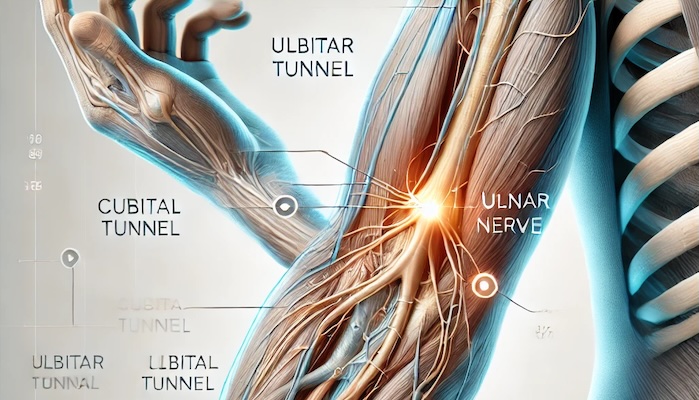
Ulnar neuropathy, commonly known as ulnar nerve entrapment, is a condition characterized by the compression or irritation of the ulnar nerve, which runs along the inner side of the elbow down to the hand. This nerve is responsible for the sensation in the fourth and fifth fingers and controls several hand muscles. When compromised, it can lead to symptoms such as numbness, tingling, and weakness in the affected hand.
Understanding Ulnar Neuropathy
The ulnar nerve passes through several narrow spaces, making it susceptible to compression, especially at the elbow (a condition often referred to as cubital tunnel syndrome) and the wrist (known as Guyon's canal syndrome). Common causes of ulnar neuropathy include repetitive elbow flexion, prolonged pressure on the elbow, direct trauma, or anatomical variations that reduce the space through which the nerve travels.
Symptoms
Individuals with ulnar neuropathy may experience:
- Numbness or tingling in the ring and little fingers.
- Weakness in hand grip.
- Difficulty with finger coordination.
- Muscle wasting in severe cases.
Diagnosis
Diagnosing ulnar neuropathy typically involves a thorough medical history review and physical examination. Tests such as nerve conduction studies and electromyography (EMG) may be employed to assess the electrical conduction of the nerve and the muscles it innervates.
Interventional Pain Management Approaches
Interventional pain management offers several minimally invasive techniques to alleviate the symptoms of ulnar neuropathy:
- Nerve Blocks: Injection of anesthetic near the ulnar nerve can provide temporary relief by interrupting pain signals.
- Steroid Injections: Administering corticosteroids can reduce inflammation around the nerve, decreasing pain and swelling.
- Physical Therapy: Tailored exercises can strengthen the muscles of the hand and forearm, improve flexibility, and reduce nerve compression.
- Splinting or Bracing: Using a brace, especially during sleep, can prevent excessive elbow flexion, reducing nerve irritation.
- Ultrasound-Guided Hydrodissection: This technique involves injecting a saline solution around the ulnar nerve under ultrasound guidance to separate it from surrounding tissues, relieving compression.
Surgical Considerations
When conservative treatments fail to provide relief, surgical intervention may be considered. Procedures such as cubital tunnel release or ulnar nerve transposition aim to relieve pressure on the nerve by enlarging its surrounding space or relocating it to a less vulnerable position.
Case Study
Consider a patient presenting with persistent numbness and weakness in the left hand, particularly affecting the ring and little fingers. After a comprehensive evaluation, including nerve conduction studies confirming ulnar neuropathy at the elbow, an interventional approach was adopted. The patient underwent ultrasound-guided steroid injections and engaged in a structured physical therapy program focusing on nerve gliding exercises. Over several weeks, the patient reported significant improvement in symptoms, regaining strength and dexterity in the affected hand.
Preventive Measures
To minimize the risk of developing ulnar neuropathy:
- Avoid Prolonged Elbow Flexion: Keep the elbow straight during rest, especially during sleep.
- Use Ergonomic Workstations: Ensure that workspaces are set up to reduce elbow strain.
- Protect the Elbow: Use padding to shield the elbow from hard surfaces.
- Strengthen Surrounding Muscles: Engage in exercises that enhance the strength and flexibility of the arm and hand muscles.
Conclusion
Ulnar neuropathy is a manageable condition with a range of interventional pain management strategies available to alleviate symptoms and improve quality of life. Early diagnosis and a comprehensive treatment plan tailored to the individual's needs are crucial for optimal recovery.
Precision Pain Care and Rehabilitation has two convenient locations in Richmond Hill – Queens, and New Hyde Park – Long Island. Call the Queens office at (718) 215-1888 or (516) 419-4480 for the Long Island office to arrange an appointment with our Interventional Pain Management Specialists, Dr. Jeffrey Chacko or Dr. Sonny Ahluwalia.













